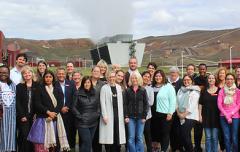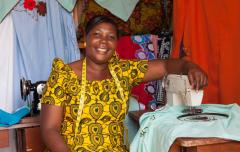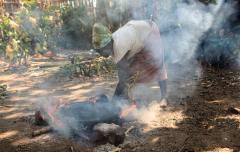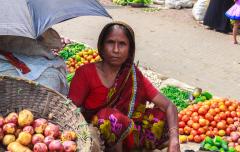Empowering women in West Africa to advance energy access goals
In many parts of Africa, a decision on who gets electricity and who doesn’t is oftentimes decided simply by your gender. In Zanzibar, for example, a study shows a male-dominated decision-making process on electrification resulted in connections going to mosques and a fish market, where men gathered, rather than a village mill where women toil for hours every day pounding maize and grain.
Now, in West Africa, a region where males dominate most cultural and social customs, countries have launched a first-of-its-kind effort to make gender inclusion and women’s empowerment a requirement for a broad swath of energy related siting and implementation decisions, including the hot-button topic of electricity access. The Economic Community of West African States (ECOWAS) recently approved a policy directive requiring the 15 countries to include gender assessments in evaluating and approving energy infrastructure projects. The effort, led by the ECOWAS Centre for Renewable Energy and Energy Efficiency (ECREEE), received strong support from government leaders at a meeting last month in Ghana. Each country will now pursue national legislation to implement the ECOWAS Directive.
At first blush, West Africa seems an unlikely place for such groundbreaking work. This is a region where precious few women hold public office, own property or even attend public meetings. It’s also a region where hundreds of millions currently lack electricity and where the impact is especially profound on women and children. Instead, and especially in rural areas, women spend most of their days collecting firewood and water for drinking and burning high-polluting charcoal and kerosene for cooking and lighting.
“In rural areas, women and girls bear an undue burden from the lack of energy access,” said Dr. Ellen Morris, president of Sustainable Energy Solutions and a Columbia University professor who has done extensive research on energy and gender issues in West Africa. “By spending so much time on meeting daily household needs, it also removes them from the workforce and limits their economic opportunities.”
Morris is helping spearhead West Africa’s effort to boost women’s participation in energy sector decisions – from renewable energy options for individual households, to large-scale energy infrastructure projects that could bring grid electricity to millions.
“The directive commits the region, all 15 countries, to take action. It’s a huge breakthrough,” said Morris, who helped organize the Ghana meeting that was hosted by ECREEE, the Clean Energy Solutions Center and several other groups. The project is the direct result of a collaboration between the Clean Energy Solutions Center and Sustainable Energy for All (SEforALL) to provide governments, like ECOWAS, with on-demand expertise to help transform their energy systems. What this looks like on the ground in West Africa is this: Burkina Faso, where after listening to women’s perspectives, more than 1,000 energy efficient stoves were installed in women-run beer breweries, leading to reduced firewood use and significantly higher profits.
Mahama Kappiah, ECREEE’s executive director, is optimistic the regional project will speed efforts to bring modern energy to hundreds of millions of people in West Africa who lack electricity. “Addressing barriers that hinder women from venturing into the energy sector cannot be overemphasized if universal energy access is to be realized,” said Kappiah, who has been instrumental in getting broad ECOWAS support for the women’s empowerment effort.
To appreciate the enormity of the undertaking, it helps to take stock of the deplorable energy access landscape in West Africa and the urgency for transforming it.
Consider first the dearth of energy access across West Africa, which stifles economic opportunities and creates profound health risks for women and children. West African countries have among the lowest energy access rates in the world. In countries like Mali, Liberia and Sierra Leone, less than 5 percent of the populations have access to modern and clean energy fuels for cooking and lighting. Most of the nearly 175,000 West Africans who die each year from their exposure to dirty dangerous cooking fuels are women and children.
Consider next the urgency and possibilities for reversing these trends. Many government leaders in the region are committed to bringing clean energy sources to urban and rural areas, whether with natural gas pipelines or distributed renewable energy, such as solar, which is getting cheaper every day. But how are energy-related decisions being made by governments and communities? And how will those decisions be impacted if women have a stronger voice?
Research and case studies across Africa and other parts of the world make clear that empowering women changes decisions – and usually for the better, especially when it comes to women and children. Research also shows that gender inequality and economic poverty are closely intertwined – tackling the former means improving the latter.
Consider this case in Tanzania, cited by Power for All, where 83 percent of women with solar lanterns reported increased control over financial decisions while 63 percent felt more respected in the community. Or an example in Lao PDR (formerly Laos), where in response to disproportionately low grid connections among female-headed households, a gender-inclusive initiative with female-friendly lending techniques boosted connection rates by over 90 percent.
There is also strong evidence showing that as more women are connected to modern energy services, entire communities will benefit, especially children and women. A recent study from Brazil showed that in rural areas with access to electricity, girls are 59 percent more likely to complete their primary education. Studies in South Africa, Nicaragua and Tanzania also show that all forms of energy access – from simple solar lanterns to full-scale electricity – result in higher self-esteem and substantially more employment opportunities outside the home.
The growing popularity of household solar systems in places like Africa and India is also creating a virtuous cycle: as more women are able to charge lights and cell phones at home with solar power, they have an opportunity to pursue economic activities, such as selling solar systems to other households. Among those seizing this opportunity is Solar Sister, whose 2,400 women entrepreneurs have brought solar lighting, mobile connectivity and clean cooking to 800,000 people in Nigeria, Tanzania and Uganda.
The opportunities for replicating such efforts are enormous. As Rachel Kyte, CEO and Special Representative of the UN Secretary-General for Sustainable Energy for All (SEforALL), told several-dozen gender diversity and energy access experts at a People-Centered Accelerator kickoff meeting in late June in Iceland, “We need to think differently about how we deliver affordable, reliable and clean energy services to those that are most marginalized. Women must be at the table.”



